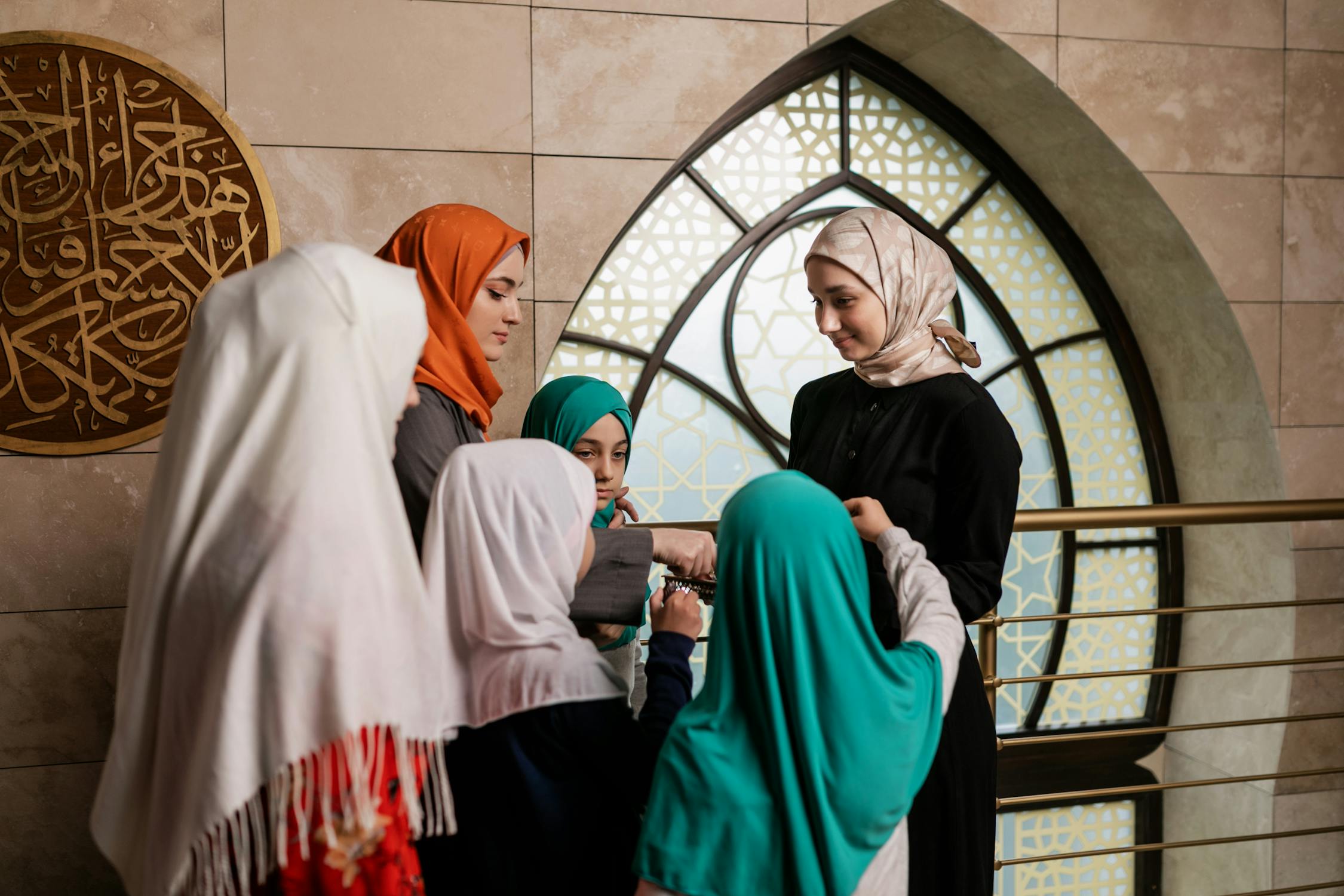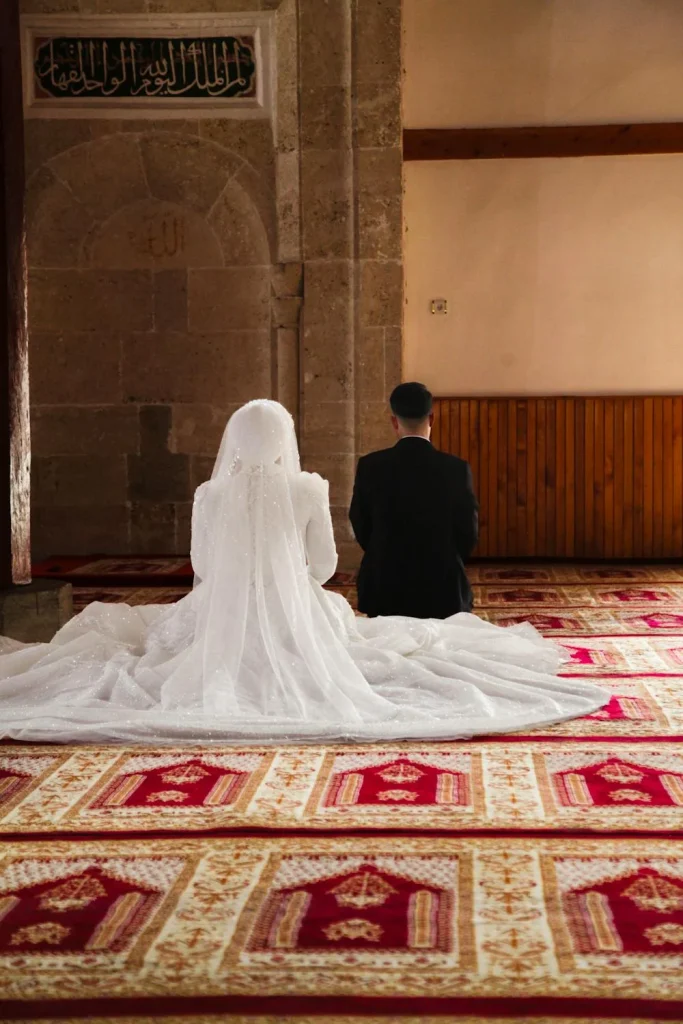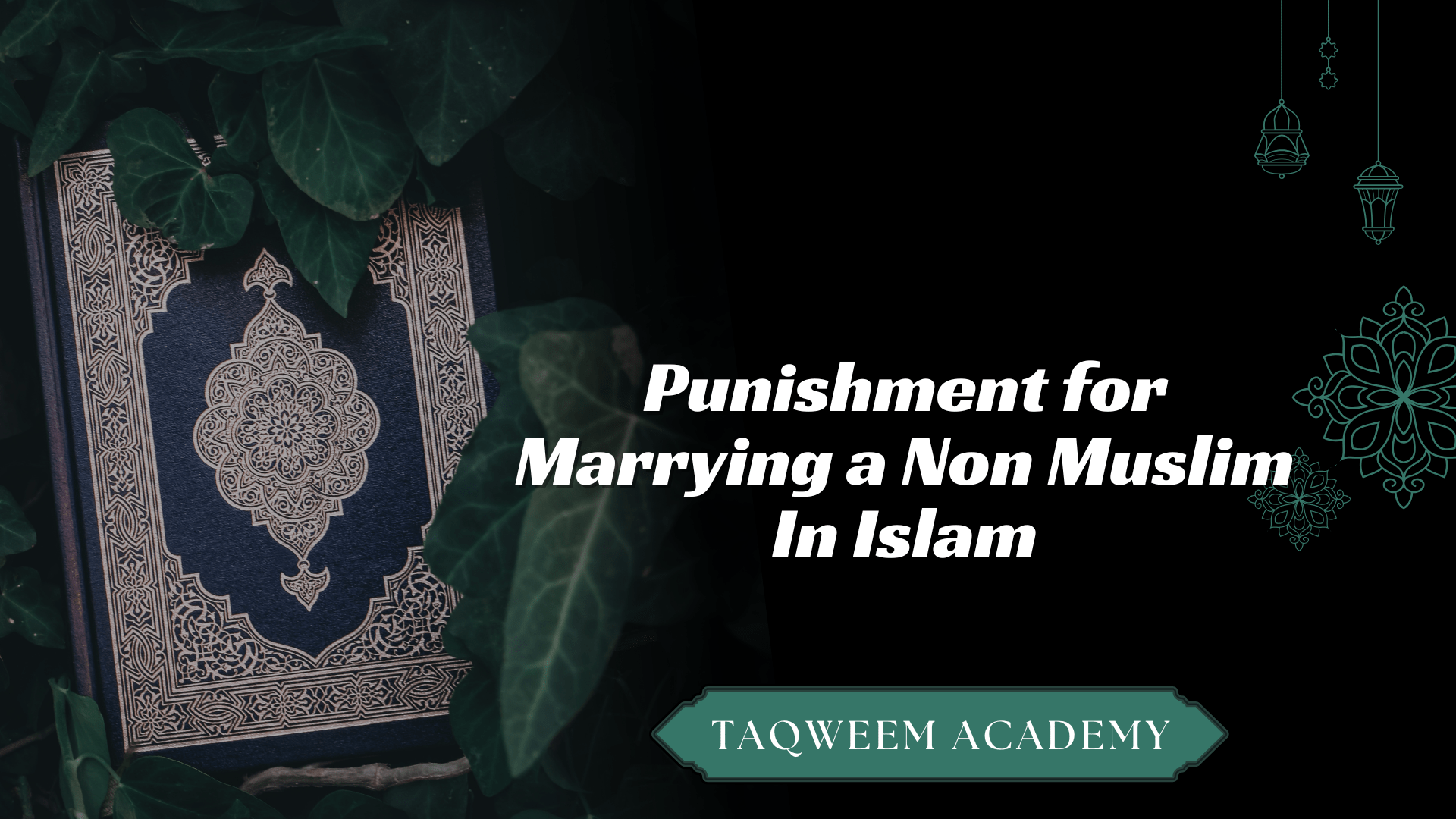Table of Contents
ToggleWhat Is the Islamic Ruling on Marrying a Non Muslim?
Punishment for Marrying a Non Muslim in Islam : For many Muslims, the idea of marrying outside the faith is frightening. You may have heard stories – whispers about death, legal horror, or punishment in this life. Your heart may be in love, but faith and family values feel at stake. This article cuts through rumors with compassion. We’ll explain what Islamic law actually says, what modern countries do, and how real couples navigate this sensitive path. If you’re worried or curious, read on with an open heart: you’ll find clear answers, empathy and practical insight.
Islamic tradition is clear on marriage: Muslim men may wed People of the Book (Jewish or Christian women), but Muslim women marrying non-Muslim men are generally prohibited. Classical jurists teach that if a Muslim woman knowingly marries a non-Muslim, her marriage is invalid. In fact, she is considered to have committed zina (illicit intercourse) and would, in theory, face the prescribed adultery punishment. (If she didn’t know the rule, the marriage is simply void without the sin.) For a Muslim man, by contrast, marriage to a non-Muslim woman is allowed (if she’s Christian or Jewish) but still discouraged to preserve faith.
Traditionally, the penalty for zina is severe: a married person guilty of adultery faces stoning to death, while an unmarried person gets 100 lashes. IslamQA (a respected fatwa site) bluntly states that a Muslim woman who marries a non-Muslim “is an adulteress, and her punishment is the punishment for adultery.”. This sounds terrifying — but it’s important to understand context. Actual Islamic law sets extreme proof standards (like four eyewitnesses) before any execution or lashes. In practice, state authorities almost never carry out these punishments. They appear more in scholarly texts than real life.
On the ground, the legal consequences vary by country. In Saudi Arabia (as noted by the U.S. Law Library), a Muslim woman’s marriage to a non-Muslim is automatically invalid unless the man converts. Without conversion, cohabiting is treated as adultery. Legally, adultery there is a hudud crime (one of five major crimes) with a possible death sentence. However, even in Saudi actual stoning is very rare. In Malaysia, any non-Muslim who wants to marry a Muslim must convert first. Some countries (Pakistan, Indonesia, the Gulf states) effectively ban such marriages or annul them, citing Sharia. In Tunisia and secular Turkey, reforms have made interfaith marriage possible without punishment.

Also Read: What Is Tajweed? Mastering Quran Recitation with Beauty & Precision
In most Muslim-majority nations, if a marriage outside Islam is discovered, the typical ”punishment” is actually civil: marriages may be annulled, couples fined, or one spouse forced to convert. Sometimes families intervene with divorce or even violence. For example, distressing reports from South Asia mention coerced conversions or worse against interfaith couples. But note: there is no universal Islamic “police force” executing people for love. In the West, a Muslim marrying a non-Muslim faces no legal penalty at all – only cultural and family pressure.
Beyond legalities, the social and emotional fallout is the most common “punishment.” Many face ostracism, heartbreak or guilt. Picture Leyla, who defied her community by loving Chris, a Christian. She lived in fear: “What about God’s wrath? My parents’ shame?” In many Muslim families, a daughter’s marriage outside faith is seen as scandalous. Couples often endure harsh words, shunning, or even threats. These real-life pressures feel punishing. Yet it’s crucial to remember: human feelings are complex, and Islam also teaches mercy. Many scholars encourage compassion – people genuinely in love deserve wise counsel more than condemnation.
Islamic Jurisprudence vs. Modern Reality:
We should stress that the Quran itself forbids marrying polytheists, but doesn’t explicitly prescribe worldly punishments for interfaith marriage. Most rules about penalties come from later jurists interpreting the Quran and Hadith. Even IslamQA points to Quranic verses and said a Muslim woman marrying a non-Muslim is akin to adultery But the Quran also reminds us that only God ultimately judges hearts. And a key principle: punishments were meant for strict, proof-laden cases. A woman who sincerely fell in love — especially without malicious intent — is not a criminal in most people’s eyes.
International and Human Rights View:
From a global perspective, outlawing interfaith marriage raises many ethical and human rights concerns. Bodies like the UN generally support freedom of religion and marriage. Indeed, many Muslims interpret Islam in a way that emphasizes consent and compassion over coercion. Progressive Muslim scholars (like Shehnaz Haqqani or Khaleel Mohammed) argue that with mutual respect and the agreement to raise children as Muslims, such marriages should be possible. This view is controversial but growing. However, it’s still far from mainstream in traditional communities.
Conclusion:
Marrying a non-Muslim in a Muslim context is emotionally charged. Legally, draconian punishments exist on paper (like death by stoning), but in reality they are almost never enforced. More common consequences are family breakups, divorce, or community backlash. Spiritually, Islam stresses that only God can punish the heart: if a person marries outside faith unknowingly, repentance and justice matter more than any earthly penalty. In practical terms, no country will jail you for falling in love. Most “punishment” is social and personal.
Ultimately, if you or someone you know is in this situation, seek wise guidance. Many communities emphasize dialogue: conversion (if sincere) or trusted counseling can resolve the conflict between heart and faith. Love is powerful and faith is precious; with knowledge and compassion, conflicts can often be resolved more gently than fear suggests.

FAQs
Can a Muslim man marry a non-Muslim woman?
Yes, by traditional Islamic law a Muslim man may marry a Christian or Jewish woman (a People of the Book). However, scholars usually advise against it unless she is deeply Muslim in practice, since the couple’s children would be raised in a different faith. There is no prescribed sharia punishment for a man doing this, but many prefer he marries a Muslim instead.
Can a Muslim woman marry a non-Muslim man?
No, traditional Islamic doctrine forbids a Muslim woman from marrying a non-Muslim man. Such a marriage is generally considered invalid unless the man converts to Islam. If it happens knowingly, classical scholars treat it as adultery (zina). In practice, a Muslim woman who does this is usually encouraged to annul the marriage or for the man to convert.
What is the punishment in Islam for marrying a non-Muslim?
Classical jurists equate a Muslim woman marrying a non-Muslim with zina (adultery). Under sharia, zina is a hudud crime: an unmarried offender faces 100 lashes, and a married one can face stoning. IslamQA explicitly says the punishment is the same as for adultery. However, these punishments have very strict proof rules, so they rarely happen. In modern practice, the “punishment” is typically social (family upset, divorce) or legal annulment, rather than physical penalties.
Is marrying a non-Muslim haram (forbidden) for Muslims?
Yes, it is generally haram for Muslim women; they are prohibited from marrying non-Muslim men. For Muslim men, marriage to a Christian or Jew is permitted (though discouraged); marriage to someone outside the People of the Book is also haram. In either case, many Muslim scholars recommend marrying within the faith. The forbiddance is rooted in the goal of religious harmony in the family.
How do Muslim-majority countries enforce interfaith marriage rules?
It varies widely. Some countries invalidate the marriage or require conversion. For example, Malaysian law forces any non-Muslim partner to convert to Islam before marrying a Muslim. Saudi Arabia treats a Muslim woman’s marriage to a non-Muslim as automatically void and considered adultery. In other places, such marriages simply aren’t registered or recognized. By contrast, some Muslim countries (like Tunisia since 2017) allow interfaith marriage for women, and secular states (Turkey, Lebanon) often have no restriction at all.
Is there a real death sentence for marrying a non-Muslim?
No country openly executes people simply for interfaith marriage today. Some laws warn of severe penalties: for instance, Saudi law considers such a marriage adultery, which is theoretically a capital offense. But even there, executions for this are unheard-of. Most governments treat it as a civil matter (annulling the marriage) rather than a criminal one. Fear of “punishment” usually stems from traditional texts, not actual legal practice.
What happens if a Muslim woman marries a Christian or Jewish man?
Traditionally, her marriage is considered invalid and she is at fault. She may face divorce, family rejection, or be urged to separate. Legally, in strict Sharia systems her husband would be seen as guilty of zina. Realistically, many such marriages are simply not recognized by courts (the couple may need to solemnize it under secular law instead). It’s a highly sensitive situation – often families get involved. The best solution usually is either annulment or the man’s conversion to Islam (making the marriage valid).
Do any Muslim scholars allow Muslim women to marry non-Muslim men?
The vast majority say no. They cite the Quran’s silence on women marrying outside Islam as a prohibition. However, some modern and reformist scholars argue for reinterpreting these rules. They suggest that if a couple agrees to raise children as Muslims and the relationship is respectful, it could be permitted. This view is still extremely rare in orthodox circles. In most communities, the classical prohibition and its reasoning (protecting faith) prevail.






